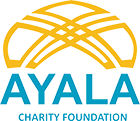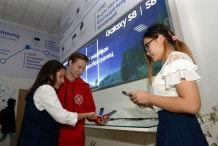The first month of classes at the Coding Lab school of programming has passed, and soon the children will go on vacation. But before they go to rest, let's take a closer look at them and find out what future programmers dream of?
Sociologists fairly call the first generation of children born in the digital world as native digitals, in contrast to digital emigrants, born earlier in the era before smartphones. They have a higher speed of information perception; they use every opportunity to connect to the information flow. Living in the world without borders, these children buy things on AliExpress, play Minecraft, download music on iTunes, stream, find answers and inspiration on the Internet.
Today’s children look at things differently, they study and plan work in a different way, and they have their own values. Having grown up with gadgets in their hands, they even think different. But with all their openness and great opportunities, teenagers do not have their heads in the clouds, they are practical realists who clearly evaluate life and have their own opinion. Many of them are ready to turn their hobbies into earnings, as they want to work for themselves. Sometimes these teenagers are able to make money on their own in the virtual world as YouTubers, Viners, LetSplayers and gamers.
And do not think that this is only about some distant overseas children living in other countries. While interviewing the students enrolled in the Coding Lab courses, we learned that some of them also try to sell their computer knowledge and skills: some try to create websites, others try to advise adults and are ready to take on difficult, but interesting tasks.
Programming courses are not only theory. There are many practical classes, where you need to solve a variety of tasks. As the guys tell, writing codes is a very fascinating process, if, of course, to get a taste. To code, for example, is to compile pages of a site, invent new games or create all sorts of reference informational data libraries that can be useful to various people.
Here is what the guys told us:
Alinur Abdresh:
- I learned about these courses from my grandfather, he is one of the first programmers in Kazakhstan; he developed programs that are now used by all libraries in the country. Grandfather really hopes that I will follow in his footsteps, because neither my father (his son) nor uncle develops programs. But I really liked to write codes, this activity is so addictive!
Aruzhan Elubay:
- I really like that besides lectures we have a lot of practice. Soon we will start developing mobile applications. I started learning the C ++ programming language by myself, and it seemed terribly difficult, but here everything is much easier for me. Because our teacher Medet Kraman explains everything very easily. You can see, that this person is passionate about his profession; he is with us on the same wave. Also the Java language, which we are currently learning, is more universal.
I always wanted to become a programmer, I have a head for this, I am something between a techie and a humanist. Well, I also like it because in movies hackers look so cool that you involuntarily want to be the same. In this activity it is important not only to be able to clear mind and solve problems. It would be nice to have features of an inventor and an innovator, because in future we will have to invent something new, while developing mobile applications.
.





